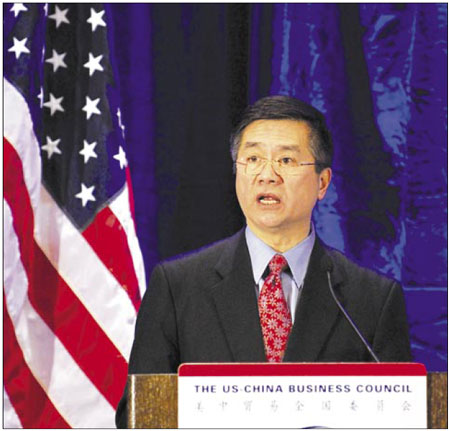US
Relations at 'turning point'
Updated: 2011-01-14 12:56
By Tan Yingzi (China Daily)
|
|
WASHINGTON - US Commerce Secretary Gary Locke has suggested that the United States and China should pursue economic cooperation over confrontation as he laid out a path to unlock the full potential for the bilateral commercial relationship.
Locke told the US-China Business Council (USCBC) luncheon on Thursday, a few days before Chinese President Hu Jintao's state visit to the United States, that the US-China economic partnership is at "a turning point" and as China becomes the world's second largest economy, both sides need to discuss how to move forward the relationship.
"In front of us is the opportunity for China and the United States to lead the world economy in the early 21st century to create a new foundation for sustainable growth for years to come," he said.
He reiterated the significance of US-China trade, saying it has become "perhaps the most important bilateral trading relationship in the world".
Locke applauded China's economic achievements, more open market and fairer competitive playing field after its accession to the World Trade Organization (WTO).
China is the third largest destination for US exports after Canada and Mexico. Total US export to China reached $90.7 billion in 2009, a USCBC report shows. And the US is the top national market for Chinese exports.
US exports to China are up 330 percent since 2000, thanks to China's accession to the WTO.
While talking about how the two countries can work together toward a more sustained world economy and citing successful examples of cooperation in the clean energy field, Locke expressed concerns of the US business community about the commercial environment in China, including inadequate intellectual property protection and market access.
At the China-US Joint Commission on Commerce and Trade (JCCT) in November, China agreed to change its innovation policies and government procurement to provide foreign companies with a more open and fair trade environment.
China promised not to discriminate against foreign enterprises in government procurement based on the origin of intellectual property.
But the US failed to make a clear commitment addressing China's concerns regarding high technology export control, market economy status and investment barriers.
Locke said the US welcomes China's commitment and hopes the agreement could be codified into laws or regulations, implemented by the central and local governments.
On Wednesday, Beijing asked Washington to assure the security of its financial assets in the country and urged the US to get its own fiscal house in order before its mountain of debt destabilizes the global economy.
Derek Scissors, economist at the Heritage Foundation in Washington, said US President Barack Obama should push for a renewed Chinese commitment to market-oriented reform, featuring a reduced role for State-owned enterprises in the economy, but the federal budget deficit has also added considerably to the bilateral trade deficit.
"Heading toward the dual transition in 2012, the most politically dangerous elements of the Sino-American relationship are economic," he said.
Despite Beijing and Washington's determination for more economic cooperation, analysts from China and the US have predicted that trade frictions will increase this year.
China will still keep its gradual appreciation of its currency though under great pressure from Washington, and it will seek more investment opportunities in the US, they said.
China Daily
Specials

President Hu visits the US
President Hu Jintao is on a state visit to the US from Jan 18 to 21.

Ancient life
The discovery of the fossile of a female pterosaur nicknamed as Mrs T and her un-laid egg are shedding new light on ancient mysteries.

Economic Figures
China's GDP growth jumped 10.3 percent year-on-year in 2010, boosted by a faster-than-expected 9.8 percent expansion in the fourth quarter.
